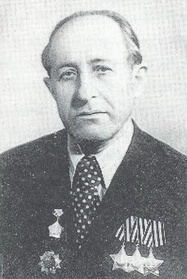Nakhman Gizis was born in 1916 in the town of Medzhibozh, Ukraine, as the tenth child in the family of a poor cobbler. In 1937 he was conscripted into the Red Navy, with which he served in the Soviet Far East, on the border with China. With the start of the Soviet-German war, Gizis and his naval comrades, then wearing infantry uniforms, were sent to the Western Front. In October 1941, Gizis took part in the defense of Moscow.
In the army, Gizis served as a scout. Being physically strong, more than once he single-handedly captured an enemy soldier and brought him to his unit for interrogation. Also on more than one occasion, after having detected gun and artillery nests, he personally directed artillery fire to destroy them. In August 1944, during the operation to force the Vistula River in Poland, he was awarded his first military order – the Order of Glory, 3rd class. The citation for his order states:
"On August 2, 1944, with a reconnaissance squad and two radio-operators, under a heavy artillery shelling, he [Gizis] crossed to the left side of the Vistula River by boat. Seeing the military dispositions of the [German] infantry there, he detected the locations of two mortar batteries and four machine-gun positons that were preventing the advance of our infantry, and sent their coordinates to our observation post. Our artillery battalion destroyed them… During the advance of our infantry, Sergeant Gizis was the first to break into the trenches of the enemy's front line. He killed two Germans with his rifle and captured two other Germans, whom he sent on to the HQ of the 629th Rifle Regiment".
Gizis was also awarded Orders of Glory 2nd class and 1st class, as well as several medals. By the end of the war his highest rank was that of senior sergeant.
In July 1943, when he received the medal "For Courage" and realizing that his regiment was then close to his native town, Gizis asked the general for leave to visit Medzhibozh where he had left behind his large family. As he recollected after the war, he found alive only his sister Dora, who had been hidden by a Ukrainian. The rest of his family had perished. As Gizis learned from Dora, his four other sisters had been killed by the Nazis and his four brothers had fallen in battle. On May 2, 1945, in Berlin, when victorious Soviet soldiers left their signatures on the walls of the Reichstag and of adjacent buildings, Gizis left five signatures: his own, as well as symbolic signatures of his brothers Aron, Abram, Hersh, and Alek.
Gizis died in 1987 in Khmelnitskii (Proskurov), Ukraine.







